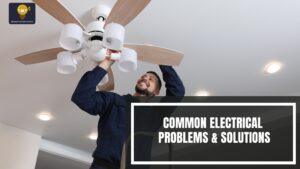Smart Guide to Electrical Wiring Services: Rewiring, Panel Upgrades & Safety Tips for Homeowners
Most homeowners don’t think twice about their electrical wiring until lights start flickering, breakers trip too often, or something smells like it’s burning behind the walls. But as homes age and technology evolves, your wiring might be struggling to keep up.
From smart appliances and electric vehicle chargers to home offices and HVAC systems, modern demands place a heavy load on outdated electrical systems. If your home is over 30 years old or showing signs of electrical stress, it might be time for a serious upgrade.
Understand When You Need Electrical Wiring Services
Not all electrical issues are emergencies, but some are red flags that your home’s wiring may need immediate attention. Ignoring them can increase the risk of shocks, fires, or system failures.
Common signs you need professional wiring help include:
- Persistent circuit breaker trips
- Flickering or dimming lights
- Buzzing sounds from outlets or walls
- Warm or discolored outlets and switch plates
- Burning smells with no visible source
- Two-prong outlets or outdated wiring setups (like knob-and-tube)
If you’re experiencing any of the above, calling a qualified electrician for an assessment is a smart move. Even if your home seems “fine”, it may be due for an upgrade simply because of age. Many insurance companies are now requiring older homes to modernize their electrical systems to maintain coverage.
Also, if you’re planning renovations or installing high-demand systems like EV chargers or HVAC upgrades, you’ll likely need a more robust electrical infrastructure to support them safely.
Whole Home Rewiring: When and Why It’s Necessary
Whole home rewiring sounds intimidating, and yes, it’s a major project, but it can also be one of the best investments you’ll make in your home’s safety and longevity.
What is whole home rewiring?
It involves replacing all the electrical wires in your home with new, up-to-code materials. This process may also include installing new outlets, switches, grounding systems, and possibly a new electric panel.
When is it necessary?
- Your home was built before the 1980s and still has original wiring
- You have aluminum wiring or knob-and-tube wiring (both fire risks)
- You’re planning a major renovation or adding new electrical loads
- Your system doesn’t meet today’s code or capacity standards
Why it matters:
- Safety: Old or degraded wiring is a top cause of electrical fires.
- Performance: Reduces electrical noise, flickers, and appliance disruptions.
- Home value: Updated wiring is a big plus for resale and insurance.
- Capacity: Supports modern usage think home offices, smart tech, and EV chargers.
The cost of rewiring the entire house varies depending on home size, wall access, and local labor rates, but expect a ballpark of $8,000 to $15,000. While not cheap, it’s far more affordable than dealing with a fire or failed inspection during a future sale.
The Electric Panel Upgrade: Your Home’s Power Heart
Think of your electric panel as the heart of your home’s electrical system. It distributes power to every circuit, and if it’s outdated or overloaded, the entire system can suffer or worse, fail dangerously.
Signs your panel needs an upgrade:
- Your panel is over 25 years old
- You still have a fuse box
- You’ve added high-demand devices (EV charger, hot tub, HVAC)
- You smell burning or see corrosion around the panel
- You frequently trip breakers or hear buzzing sounds
Upgrading to a modern 200-amp panel (from 100-amp or fuse systems) gives you more capacity, reduces fire risks, and prepares your home for future tech like solar panels or car chargers.
What it involves:
- Removing the old panel
- Installing a new, code-compliant breaker box
- Coordinating with your utility company for power shut-off and reconnection
- Scheduling inspection and permit approvals
Expect costs between $1,500 to $3,500 for a panel upgrade, depending on labor, permits, and materials.
Choose the Right Electrician for Wiring or Panel Work
Rewiring or upgrading a panel isn’t a DIY job. Hiring a qualified electrician ensures the work is safe, legal, and long-lasting.
Key things to look for:
- State-licensed and bonded
- Insured (liability + worker’s comp)
- Residential experience, specifically with whole-home rewiring or panel upgrades
- Familiarity with your local building codes
Ask for:
- Proof of credentials
- Project photos or references
- A written scope of work and warranty terms
The right electrician will not only install correctly but also handle permits, code compliance, and post-installation support.
Ask the Right Questions Before Hiring
Before signing any contracts, ask specific questions to make sure you’re getting someone skilled and trustworthy.
- Have you done similar projects in homes my age or size?
- What materials and brands do you use for wiring and breakers?
- What’s your process for cleanup and drywall repair, if needed?
- Will you coordinate permits and inspections?
- Do you offer a workmanship warranty?
Their answers will help you filter out vague contractors and focus on professionals who take pride in detailed, safe installations.
Permits, Inspections, and What to Expect
Rewiring and panel upgrades require official permits in most jurisdictions. A reputable electrician will file the paperwork and schedule inspections with local authorities.
What to expect:
- The electrician submits plans for review.
- An inspector checks the work mid-job or post-installation.
- You’ll receive a signed-off inspection certificate, which is important for insurance or resale.
Pro tip: Keep these documents in your home records for future reference.
Be Budget Smart But Don’t Cut Corners
Yes, electrical work can be expensive, but it’s not the place to cut corners. The lowest quote might look tempting, but it can also signal:
- Use of substandard materials
- Inexperienced labor
- Skipped permits or inspections
How to manage costs smartly:
- Get 2–3 detailed quotes
- Ask about payment plans or phased installations
- Consider bundling services (panel + rewiring) for a better rate
- Ask if off-peak scheduling can reduce labor charges
Above all, invest in quality; you’re protecting your home and your family.
Final Thoughts: Wiring Your Home for Safety & the Future
Your home’s electrical system is too important to ignore. Whether you’re planning a full renovation or just noticing signs of aging wiring, investing in professional electrical wiring services, a whole home rewiring, or an electric panel upgrade is essential for safety, efficiency, and peace of mind. Work with a licensed electrician who understands residential needs, complies with local codes, and provides clear, upfront pricing. A well-executed upgrade not only enhances your home’s performance it also protects what matters most.
FAQs
Q1: How long does whole home rewiring take?
Typically 3–10 days, depending on the home’s size and accessibility. Your electrician will give a project timeline after inspection.
Q2: What’s the cost of an electric panel upgrade?
Most upgrades cost between $1,500 to $3,500, depending on amperage, materials, and labor.
Q3: Can I live in my house during rewiring?
Yes, in most cases. Your electrician may shut off power in sections to minimize disruption.
Q4: Do I need a panel upgrade to install an EV charger?
Often, yes, especially if your panel is below 200 amps or already maxed out.
Q5: Is rewiring covered by homeowners insurance?
Not usually, unless it’s part of a claim. However, rewiring may help lower your premiums by reducing risk.




